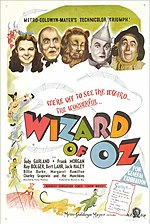
Glinda is a fictional character created by L. Frank Baum for his Oz novels. She first appears in Baum's 1900 children's classic The Wonderful Wizard of Oz, and is the most powerful sorceress in the Land of Oz, ruler of the Quadling Country South of the Emerald City, and protector of Princess Ozma.

A Munchkin is a native of the fictional Munchkin Country in the Oz books by American author L. Frank Baum. They first appear in the classic children's novel The Wonderful Wizard of Oz (1900) where they welcome Dorothy Gale to their city in Oz. The Munchkins are described as being the same height as Dorothy and they wear only shades of blue clothing, as blue is the Munchkins' favorite color. Blue is also the predominating color that officially represents the eastern quadrant in the Land of Oz. The Munchkins have appeared in various media, including the 1939 film The Wizard of Oz, as well as in various other films and comedy acts.
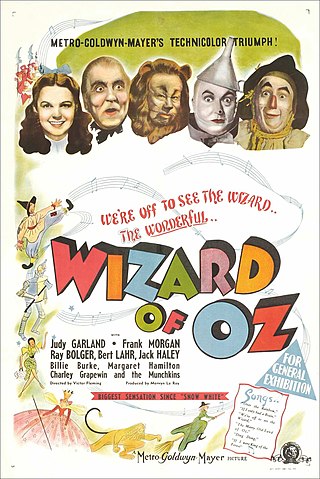
The Wizard of Oz is a 1939 American musical fantasy film produced by Metro-Goldwyn-Mayer (MGM). An adaptation of L. Frank Baum's 1900 children's fantasy novel The Wonderful Wizard of Oz, it was primarily directed by Victor Fleming, who left production to take over the troubled Gone with the Wind. It stars Judy Garland, Frank Morgan, Ray Bolger, Bert Lahr, Jack Haley, Billie Burke and Margaret Hamilton. Noel Langley, Florence Ryerson and Edgar Allan Woolf received credit for the screenplay, while others made uncredited contributions. The music was composed by Harold Arlen and adapted by Herbert Stothart, with lyrics by Edgar "Yip" Harburg.

The Wicked Witch of the East is a fictional character created by American author L. Frank Baum. She is a crucial character but appears only briefly in Baum's classic children's series of Oz novels, most notably The Wonderful Wizard of Oz (1900).

The Muppets' Wizard of Oz is a 2005 musical fantasy television film directed by Kirk R. Thatcher, and the third television film featuring the Muppets. The film stars Ashanti, Jeffrey Tambor, Quentin Tarantino, David Alan Grier, Queen Latifah, as well as Muppet performers Steve Whitmire, Dave Goelz, Bill Barretta, and Eric Jacobson. A contemporary adaptation of the 1900 novel The Wonderful Wizard of Oz by L. Frank Baum, the story follows young Dorothy Gale, who works in her Aunt Em's diner, but dreams of becoming a singer somewhere beyond her small Kansas town. Swept up by a tornado, in her trailer home with pet prawn Toto, she lands in Oz and embarks on a journey to meet the Wizard who can help make her dreams come true.

The Good Witch of the North, sometimes named Locasta or Tattypoo, is a fictional character in the Land of Oz, created by American author L. Frank Baum. She is the elderly and mild-mannered Ruler of the Gillikin Country. Her only significant appearance in Baum's work is in Chapter 2 of The Wonderful Wizard of Oz (1900), in which she introduces Dorothy Gale to Oz and sends her to meet the Wizard, after placing a protective kiss on her forehead. She makes a brief cameo appearance at Princess Ozma's birthday party in The Road to Oz (1909), but is otherwise only mentioned elsewhere in the series.
"We're Off to See the Wizard" is one of the classic songs from the Academy Award-winning 1939 film The Wizard of Oz. Composer Harold Arlen described it, along with "The Merry Old Land of Oz" and "Ding-Dong! The Witch Is Dead", as one of the "lemon drop" songs of the film. The lyrics are by E.Y. "Yip" Harburg.
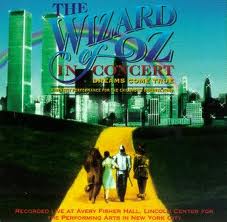
The Wizard of Oz in Concert: Dreams Come True is a 1995 television musical performance based on the 1939 film The Wizard of Oz. The book and score of the film were performed on stage at Lincoln Center to benefit the Children's Defense Fund. The concert featured guest performers including Jackson Browne as the Scarecrow, Roger Daltrey as the Tin Man, Natalie Cole as Glinda, Joel Grey as the Wizard, Jewel as Dorothy, Nathan Lane as the Cowardly Lion, Debra Winger as the Wicked Witch, and Lucie Arnaz as Aunt Em. The Boys Choir of Harlem appeared as the Munchkins, and Ry Cooder and David Sanborn performed as musicians.
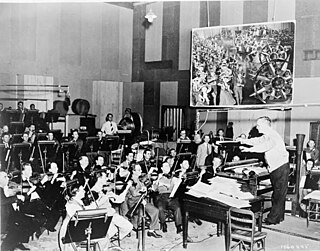
The songs from the 1939 musical fantasy film The Wizard of Oz have taken their place among the most famous and instantly recognizable American songs of all time, and the film's principal song, "Over the Rainbow", is perhaps the most famous song ever written for a film. Music and lyrics were by Harold Arlen and E.Y. "Yip" Harburg, who won an Academy Award for Best Song for "Over the Rainbow."
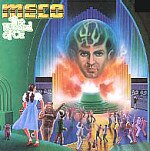
Meco Plays The Wizard of Oz is an album by the American musician Meco, released in 1978. The album sold around 400,000 copies.

The Wizard of Oz is a musical with a book by John Kane, music by Harold Arlen and lyrics by E. Y. Harburg. It has additional background music by Herbert Stothart. It is based on the 1900 novel The Wonderful Wizard of Oz by L. Frank Baum and the 1939 film version written by Noel Langley, Florence Ryerson and Edgar Allan Woolf.

Ruth Leone Duccini was an American actress.

Karl Becker, billed as Charlie Becker, was a German American actor. He was 3'9" in height, and is best known for appearing as the Mayor of Munchkinland in The Wizard of Oz (1939). Billy Bletcher dubbed the Mayor's vocals in the film.

The Wizard of Oz is a 2011 musical based on the 1939 film of the same name in turn based on L. Frank Baum's novel The Wonderful Wizard of Oz, with a book adapted by Andrew Lloyd Webber and Jeremy Sams. The musical uses the Harold Arlen and E. Y. Harburg songs from the film and includes some new songs and additional music by Lloyd Webber and additional lyrics by Tim Rice. It is the third stage musical adaptation of the film following the 1942 version for the St. Louis Municipal Opera and the 1987 version for the Royal Shakespeare Company.

The Wizard of Oz is a musical commissioned by The Muny based on the 1900 novel The Wonderful Wizard of Oz by L. Frank Baum and the 1939 film, The Wizard of Oz, using the film's songs by Harold Arlen and E. Y. Harburg. The book of the musical is by Frank Gabrielson, who would later write an adaptation of The Marvelous Land of Oz (1960) for Shirley Temple.
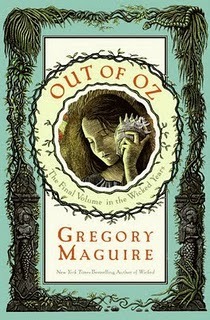
Out of Oz is the fourth and final novel in Gregory Maguire's The Wicked Years and was released on November 1, 2011. Out of Oz brings a conclusion to the narratives spread across The Wicked Years while providing a revisionist look at L. Frank Baum's Land of Oz incorporating elements from Baum's series as well as the 1939 film adaptation of the original novel. This novel presents an Oz in the middle of a civil war plagued with depression and adult situations, from the perspective of Rain, the young granddaughter of Elphaba Thropp, Maguire's reimagining of The Wicked Witch of the West.

"I'm in Love with Margaret Thatcher" is a 1979 single by the English punk band Notsensibles. It was originally written as a tongue-in-cheek comment on Margaret Thatcher, and following her death in 2013 was part of a social media campaign to get it to number one on the UK Singles Chart. The song charted at number 35 on the chart on 12 April 2013.
The Wizard of Oz, subtitled Live Australian Cast Recording is a cast recording of the 2001 Australian production of the stage musical The Wizard of Oz, featuring Nikki Webster. It was nominated for the 2002 ARIA Award for Best Cast or Show Album.

Harold Sings Arlen (With Friend) is a 1966 vocal album by the composer Harold Arlen with arrangements by Peter Matz. Arlen is accompanied on two songs by Barbra Streisand. This was Arlen's only album on which he performed as a singer.
Francis "Frank" "Cookie" Cucksey was an American actor, singer, and circus performer, best known for his role as a Munchkin in the 1939 film The Wizard of Oz.

















